Evan Roskos's Blog, page 8
January 8, 2013
Whitman + Comic = beauty
I have to share this comic. Great style and a great application of Whitman, a poet who celebrates science and nature. And one who reminds us that the beauty of one can help us appreciate the beauty of the other on those days when perspective has diminished.
http://zenpencils.com/comic/88-walt-w...
http://zenpencils.com
You can also purchase some of the comics as prints. Enjoy!
http://zenpencils.com/comic/88-walt-w...
http://zenpencils.com
You can also purchase some of the comics as prints. Enjoy!
Published on January 08, 2013 14:27
December 13, 2012
On music: Sadstalgia
Sadstalgia - noun - the alluring depression felt when thinking about certain music, films, books, or people. "I was up all night listening to the second Counting Crows album and wallowing in sadstalgia."
Like many people, I have an emotional relationship to music. Perhaps it was the years of oldies radio my mom listened to when I was a kid. Or the years of Kenny G, Sade, James Taylor, Patsy Cline, and Whitney Houston my mom also listened to. Constantly. Maybe it's because of all the times my best friend Scott and I listened to Metallica in fourth grade. Or how my sister leant me that Faith No More tape and said "I'm not sure I like it" but then realized she did like it and I liked it and how could you not like it?
Nostalgia is a perfectly good word for fond memories, but I feel like it's not quite accurate when it comes to the experience I have when listening to certain albums/songs. As someone who's long suffered from depression, I've got many, many songs that spark a solid, crystalline sadness when I hear them. Sometimes there are particular people associated with the music (past crushes, lost friends) sometimes events (long road trips, summer vacations).
I feel that Sadstalgia is a nerdy way to talk about those pieces of music (or books, movies, people) that cause me to feel a vibrating tightness in the bottom half of my heart. It's sadness but the kind I can get near without being damaged -- as if time has applied a layer of protection from the pain radioactivity still pulsing outward from those potent moments of my youth. Douglas Coupland's Life After God describes this potency of certain memories most effectively:
So, in that joyous spirit, here are a list of my Sadstalgia albums:
Bloodletting by Concrete Blonde -- Most severely felt in the opening track, that moody, bass-bouncing opening I most readily associate with the era my sister read tons of Anne Rice and I was just getting tired of Stephen King even though The Dark Half kinda kicked ass. Most potent moment: "You were a vampire and now I'll never see the lie-ee-ii-ee-ii-ee-ight!"
Recovering the Satellites by Counting Crows -- Freshmen year of college, particularly the first semester. Most potent sadstalgia: opening notes of either title track or "A Long December." Dear god, I feel it. DEAR GOD.
No Adam Duritz! NO!!!! Parachutes & b-sides by Coldplay -- makes me think of a particular girl and the Northeast extension of the PA turnpike, which I had to drive to see her. In some ways, it's best if I don't listen to Coldplay at all, but when I hear any of their early songs I'm thrown into the moment of driving at night on a road where the exits are 20 miles apart (what is WRONG with you Pennsylvania?!) Most potent song: "See You Soon"
"See You Soon" by Coldplay
"Protected from the Rain" by Grandaddy -- this b-side sends me to an overseas business trip I took in 2002. Not a dense feeling of sadness as much as disconnection because I was far from home for two weeks and full of anxiety. Most potent moment: "that poem you left on my windshield wrapped in plastic to protect it from the rain...protect it from the rain..."
The River Runs Red by Life of Agony -- this hardcore-ish concept album has some of the most horrible between-song skits that are supposed to tell the story of a teenager with a shitty life who ends up killing himself by the end of the album. The songs, however, are more well done. Still, this album puts me right back into a particular winter with a pile of Marvel comics that I re-read obsessively. Most potent moment: First 40 seconds of "River Runs Red."
Vulgar Display of Power by Pantera -- school bus and crappy headphones for a walkman cassette player (I'm old). While Far Beyond Driven and Cowboys from Hell also got tons of my attention back in the early nineties, this album has that perfect balance of guitar solo nastiness and control and aggressive that triggers my sadstalgia feeling. Most potent sadstalgia: the "1-2-3-4!" opening to "Fucking Hostile" right up to the chorus (i.e., first 40 seconds).
Bringing Down the Horse by The Wallflowers -- as a testament to my random musical taste, I include the two songs that haunted me for years from the summer before I went to college. It was a rough year! Potency overload thanks to life changes and summer relationship and anxieties and really catchy choruses: "One Headlight" and "6th Avenue Heartache."
Last three tracks on Third Eye Blind's debut album -- these songs still have the power to knock me for a loop and I'm still not 100% sure why. I didn't like this band until I saw them in concert (I went with my cousin simply because Our Lady Peace was the opening act). But then I heard these songs on the album and something about them -- I have no idea. Was it a girl? Was it depression? Was it life changes? Was it some hidden code that only reveals itself if you listen to the songs backwards 666 times? Who knows. Most potent sadstalgia: Pretty much the entire three tracks are poison and yet I've listened to them countless times because I enjoy causing myself existential pain.

Like many people, I have an emotional relationship to music. Perhaps it was the years of oldies radio my mom listened to when I was a kid. Or the years of Kenny G, Sade, James Taylor, Patsy Cline, and Whitney Houston my mom also listened to. Constantly. Maybe it's because of all the times my best friend Scott and I listened to Metallica in fourth grade. Or how my sister leant me that Faith No More tape and said "I'm not sure I like it" but then realized she did like it and I liked it and how could you not like it?
Nostalgia is a perfectly good word for fond memories, but I feel like it's not quite accurate when it comes to the experience I have when listening to certain albums/songs. As someone who's long suffered from depression, I've got many, many songs that spark a solid, crystalline sadness when I hear them. Sometimes there are particular people associated with the music (past crushes, lost friends) sometimes events (long road trips, summer vacations).
I feel that Sadstalgia is a nerdy way to talk about those pieces of music (or books, movies, people) that cause me to feel a vibrating tightness in the bottom half of my heart. It's sadness but the kind I can get near without being damaged -- as if time has applied a layer of protection from the pain radioactivity still pulsing outward from those potent moments of my youth. Douglas Coupland's Life After God describes this potency of certain memories most effectively:
I thought of this: I thought of how every day each of us experiences a few little moments that have just a bit more resonance than other moments—we hear a word that sticks in our mind—or maybe we have a small experience that pulls us out of ourselves, if only briefly—we share a hotel elevator with a bride in her veils, say, or a stranger gives us a piece of bread to feed to the mallard ducks in the lagoon; a small child starts a conversation with us in a Dairy Queen[...]Sadstalgia is the feeling you get when you don't want to go back to the time associated with something, and even you've been reminded of that time and have moved far enough past it to not be dragged down too deeply into a destructive sadness.
And if we were to collect these small moments in a notebook and save them over a period of months we would see certain trends emerge from our collection—certain voices would emerge that have been trying to speak through us. We would realize that we have been having another life altogether; one we didn’t even know was going on inside us. And maybe this other life is more important than the one we think of as being real—this clunky day-to-day world of furniture and noise and metal. So just maybe it is these small silent moments which are the true story-making events of our lives. [quote taken from Goodreads]
So, in that joyous spirit, here are a list of my Sadstalgia albums:
Bloodletting by Concrete Blonde -- Most severely felt in the opening track, that moody, bass-bouncing opening I most readily associate with the era my sister read tons of Anne Rice and I was just getting tired of Stephen King even though The Dark Half kinda kicked ass. Most potent moment: "You were a vampire and now I'll never see the lie-ee-ii-ee-ii-ee-ight!"
Recovering the Satellites by Counting Crows -- Freshmen year of college, particularly the first semester. Most potent sadstalgia: opening notes of either title track or "A Long December." Dear god, I feel it. DEAR GOD.
No Adam Duritz! NO!!!! Parachutes & b-sides by Coldplay -- makes me think of a particular girl and the Northeast extension of the PA turnpike, which I had to drive to see her. In some ways, it's best if I don't listen to Coldplay at all, but when I hear any of their early songs I'm thrown into the moment of driving at night on a road where the exits are 20 miles apart (what is WRONG with you Pennsylvania?!) Most potent song: "See You Soon"
"See You Soon" by Coldplay
"Protected from the Rain" by Grandaddy -- this b-side sends me to an overseas business trip I took in 2002. Not a dense feeling of sadness as much as disconnection because I was far from home for two weeks and full of anxiety. Most potent moment: "that poem you left on my windshield wrapped in plastic to protect it from the rain...protect it from the rain..."
The River Runs Red by Life of Agony -- this hardcore-ish concept album has some of the most horrible between-song skits that are supposed to tell the story of a teenager with a shitty life who ends up killing himself by the end of the album. The songs, however, are more well done. Still, this album puts me right back into a particular winter with a pile of Marvel comics that I re-read obsessively. Most potent moment: First 40 seconds of "River Runs Red."
Vulgar Display of Power by Pantera -- school bus and crappy headphones for a walkman cassette player (I'm old). While Far Beyond Driven and Cowboys from Hell also got tons of my attention back in the early nineties, this album has that perfect balance of guitar solo nastiness and control and aggressive that triggers my sadstalgia feeling. Most potent sadstalgia: the "1-2-3-4!" opening to "Fucking Hostile" right up to the chorus (i.e., first 40 seconds).
Bringing Down the Horse by The Wallflowers -- as a testament to my random musical taste, I include the two songs that haunted me for years from the summer before I went to college. It was a rough year! Potency overload thanks to life changes and summer relationship and anxieties and really catchy choruses: "One Headlight" and "6th Avenue Heartache."
Last three tracks on Third Eye Blind's debut album -- these songs still have the power to knock me for a loop and I'm still not 100% sure why. I didn't like this band until I saw them in concert (I went with my cousin simply because Our Lady Peace was the opening act). But then I heard these songs on the album and something about them -- I have no idea. Was it a girl? Was it depression? Was it life changes? Was it some hidden code that only reveals itself if you listen to the songs backwards 666 times? Who knows. Most potent sadstalgia: Pretty much the entire three tracks are poison and yet I've listened to them countless times because I enjoy causing myself existential pain.
Published on December 13, 2012 04:00
December 10, 2012
On music: favorite albums from 2012
I pay for my music. As such, I tend to be a little picky about what I buy. Spotify was the greatest thing to happen in music in the past few years, at least for me, because it meant I didn’t have to be shady about my music listening habits. I could listen without stealing and pay for stuff without buying it. Good for the bands and labels, good for me.Now, I don’t label this list “best of 2012” for a reason: taste is too hard to argue though fun to discuss. While I certainly like lots of different sounds, I’m also very stubborn about recommendations. It’s sad and difficult. I don’t see myself as a hipster who only listens to bands with a fanbase of less than 500 people; but I do have the hipster tendency to prefer my own discoveries over the suggestions of others.That being said, the previously mentioned Spotify does allow me to explore a little more liberally. Still, when people send me songs, I don’t always rush to listen. I think I’m getting better.Anyway. Below are some albums I bought this year. I enjoy them. Some I really enjoy and will likely listen to for years to come. Others might seem great now but fall out of rotation. So be it.
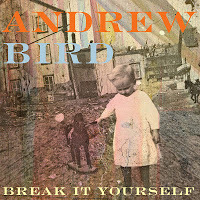
Andrew Bird - Break it Yourself - the album I listened to the most and one that will likely get plenty of play in the future. Basically, Andrew Bird makes music I can fall into easily. Great lyrics, great rhythms, great arrangements, and his voice is stellar.
Serj Tankian - Harakiri - Didn’t even know this was coming out and yet there it appeared in iTunes one day. The drumming on “Figure it Out” is speed metal drumming. Blistering. Amazing. Great hooks, silly lyrics. And not overproduced like the prior release.
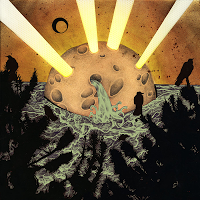
Murder By Death - Bitter Drink, Bitter Moon - Some great tunes including “Lost River” and “I Came Around.” Another strong, distinct vocal performance. The aggressive cello work stands out as the highlight of certain songs.
The Lumineers - The Lumineers - I feel like this is the version of Mumford and Sons that I can get into. Short, sweet songs. Great vocals. Great hooks. My son even loved this album and his taste in music is still being ironed out.
Mark Lanegan - Blues Funeral - Mark Lanegan has one of the greatest voices in music. Is it the cigarettes and liquor or some evolutionary trait that ensures he’ll procreate with plenty of people? Who knows. This album throws a few curve balls (“Ode to Sad Disco” being one) but nothing seems like a reach for Lanegan and his band. So much fun, so sad, so dark, so real. All at once.

Godspeed You! Black Emperor - Allelujah! Don’t Bend Ascend - I’m still amazed. I can’t figure out if the album is really good or that it’s been so longsince their last release that I’m willing to enjoy anything. This doesn’t deviate from the typical Godspeed songwriting:in this case two 20 minute epics coupled with 6 minute palatte cleansers. But the drums and texture seem better than the last release and reminiscent of their masterpiece Raise Your Skinny Hands….
Menomena - Moms - I had no idea this band was such a mess. But the last album did seem disjointed with a few gems but a lack of momentum that their sophomore album, Friend and Foe, had plenty of. Fortunately some of the best elements of the original trio’s work has not been lost on Moms, even with one member off seeking greener pastures. Here’s hoping they can carry on and build on this album.
Japandroids - Celebration Rock - Fast. Fun. Just perfectly done rock.
Spiritualized - Sweet Heart Sweet Light - Truly does feel like a sibling to the masterpiece Ladies and Gentlemen We Are Floating In Space.
Albums that just didn’t hit me, despite how much I liked prior release:
Patrick Wilson - Adventures in Your Own Backyard - A random discovery on Spotify, the opening track (“Lighthouse”) alone got repeated plays from me. Some other great tracks but, honestly, that opening track might be all I ever need.
Band of Skulls - Sweet Sour - Not a bad album at all, but it didn’t feel as energized as their debut. I will pick up their next album and hope it’s got the spark.
Amanda Palmer - Theatre is Evil - Got through this once can’t remember any of it. Perhaps it’s the production, the arrangements, the lack of piano? No idea. Though, I will say I have a playlist of Who Killed Amanda Palmer that leaves out 2 tracks so maybe I wasn’t meant to be her biggest fan.Air - Le Voyage Dans La Luna - Such a cool idea: an updated soundtrack to the famous silent film Voyage to the Moon. The music IS good as a standalone album, but it doesn’t really seem to fit with the movie. I was really surprised at how disconnected the two seemed.
Smashing Pumpkins - Oceania - I have such a softspot for Smashing Pumpkins. I still listen to their first four albums constantly. The opening track is promising but without the jazz-influenced drums and the 90s crunch distortion Corgan made his signature and later dropped, it’s just not the same.
Published on December 10, 2012 20:17
December 9, 2012
Some of my favorite 2012 reads
Throughout the year I've read and reviewed a few books (certainly not as many as I bought). Some of my reading time gets devoured by the college lit courses I teach, so I've re-re-read a number of great titles this year (Passing by Nella Larsen, The Things They Carried by Tim O'Brien, Medea by Euripides, Heart of Darkness by Joseph Conrad, and various short fiction by Flannery O'Connor).But I'd like to share some of my favorite reads and reviews from this year. One thing I realized as I gathered these links: all but 1 of these books has a great (i.e., perfectly fitting) cover. (Sorry Billy Lynn, while your cover isn't particularly BAD it's not as striking as the rest of these.)
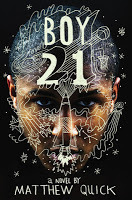
Boy21 by Matthew Quick -- If you don't know who Matthew Quick is yet, you will. Aside from the mammoth critical success of the film adaptation of his debut novel, his 2013 release, Forgive Me, Leonard Peacock, will be in the running for major awards. Before all that, though, there's Boy21, a fantastic exploration of two boys who become friends thanks to basketball, the music of Sun Ra, and a shared disconnection from the world.
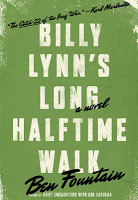
Billy Lynn's Long Halftime Walk by Ben Fountain -- ended up on tons of Best of 2012 lists (even lists that were otherwise dull). Worth the recognition and something you should check out if you want a good satire about the Bush years and domestic perspective of Iraq War part deux.

Little Velázquez by Kathryn Kopple -- I blurbed this book. But even if I hadn't blurbed it and didn't become friends with Kopple back in 2008 at the Breadloaf Writer's Conference, I would love this book. A historical fiction about a little known dwarf living in the court of Isabel and Ferdinand, this book blew me away from start to finish. Great sentences, great use of history that never overwhelms, great analysis of women with power, and women without power.
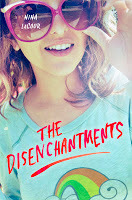
The Disenchantments by Nina LaCour -- A book that haunted me, although that might suggest a more serious subject matter (such as LaCour's debut . The complexity of this road trip novel is never weighed down by the prose and offers some amazing scenes.
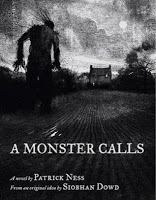
A Monster Calls by Patrick Ness -- A short review back when I read it because it's the kind of book that elicits a strong response and begs to be experienced purely. Sad, profound, funny, and beautifully illustrated. The kind of book you want in hardcover since the story and the pictures work together.
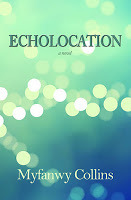
Echolocation by Myfanwy Collins -- The second book on this list that offers beautiful, crushing, complex presentation of women in crisis. Moves between perspectives with deft and has me looking forward to her collection of fiction, due out in January.
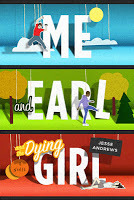
Me, Earl, and the Dying Girl by Jesse Andrews -- a funny and honest presentation of a teenager's views of death and friendship. Walks a fine line and, in my opinion, succeeds. One of two books I read in about 1 sitting, pretty much against my will (Boy21 was the other.)
(Note: all of my reviews are on Goodreads, though some of these links will send you to my blog instead. The content is the same regardless of which site it appears. I just didn't figure out how to get the Goodreads posts to appear on my blog until a few months back.)
Published on December 09, 2012 20:08
December 5, 2012
Review: Forgive Me, Leonard Peacock

Forgive Me, Leonard Peacock by Matthew Quick
My rating: 5 of 5 stars
(disclaimer: Matthew Quick and I are good friends. But that's not why I love this book.)
Put simply, this is an intense, gripping portrayal of a teenage boy who decides to kill his former best friend. Fans of Quick's previous work will sense, immediately, that this is something of a tonal shift, though all of Quick's narrators find themselves in emotionally challenging, often dark, places. In this case, though, we're introduced to Leonard Peacock -- a boy who's in a darker place than we've ever seen in prior books by the author. Amber, of SORTA LIKE A ROCK STAR, certainly has her depression midway through her novel. But Leonard is an all encompassing, authentically sad and angry character.
He has reason to be.
I can't review the bulk of this book without spoiling plot elements. If the setup doesn't grip you, then know that the other hallmark's of Quick's work -- a unique, engaging voice; earned emotional moments; visual descriptions that linger long after the story's done -- are present. This is not a departure, a change, a reinvention of Quick's path as an author. This is the best exploration of a teenager's angry despair that you may ever read.
View all my reviews
Published on December 05, 2012 09:24
October 20, 2012
Review: BUTTER
Lange's debut novel works with a profound mixture of crucial topics: obesity, bullying, the power of the internet, parenting woes, and the power of music. If you suspect this book is a mess because it attempts to work all of these ingredients together, you suspect wrong. (Also, that's my only food related metaphor for this review. I promise. Oh wait, Promise is a non-dairy spread. argh!)
Back on target.
Butter, the protagonist, walks a fine line of being sympathetic and unsympathetic. He's obese and relatively okay with it, though plenty of things in his life cause him to question his lifestyle. It's not difficult to see why he's complacent, since his mother obsesses over his eating habits but seems incapable of controlling his diet in a meaningful way (aside from cutting out sugar at one point). I could see a version of this book wherein Butter drives readers away, but there's something about him that's vulnerable without being forced. Butter doesn't begin to change his behavior until he finds an online forum featuring comments from his friends at school, who vote him Most Likely to Die of a Heart Attack. He's forced to see himself through the eyes of his peers -- and the internet certainly can make that feeling sharp and profound. He doesn't like what he sees (and reads). So he decides to give up.
Now, it's never completely clear whether Butter truly meant to kill himself live on New Year's Eve or if he meant to just create another buffer around himself by showing people he knew what they said/thought about him. Butter goes back and forth, which means I go back and forth as well. In the end, it doesn't matter what his INITIAL intention is, just what he ultimately chooses to do. I think the book succeeds because of Butter's ambivalence to his own decision. The threat to kill himself, though, needs to feel possible, and Butter gathers information that suggests he is planning his suicide, though, he's more than willing to back off when something positive happens in his life (weight loss, cute girl is nice to him, etc).
In many ways, the specter of death is one of the most crucial aspects of life's meaning. Without death, life carries on endlessly. Death forces us to ponder meaning, purpose, morality, and more, simply because we know we'll run out of time eventually. (Anyone who's read any Modernist literature knows the importance of death to literary characters. It's the fuel for much philosophizing.)
Here, Butter decides to eat himself over the edge and it causes him to change his behavior. He gains popularity, gains access to the girl he's had a crush on from afar (and a relationship over the internet), he gains a sense of worth. All because he decided his life had no worth.
As the plot progresses, Lange rightly focuses on Butter and his struggle as opposed to the various social issues the novel threads together. I found his complexity and hypocrisy very satisfying more so because Lange does not obsess on certain aspects of the story -- the power of the internet, as well as parenting woes. In lesser hands, a certain amount of moralizing and demonizing would occur to be sure the reader understood that the internet is bad or that parents are just "doing their best." While I can't answer for other readers, I never felt Butter's parents were simply good or bad, just frustrated (and, for me, frustrating in their believable behaviors). Nor did I find Butter's experience on the internet to be a judgment of the internet itself, (though it plays a huge role in Butter's self-esteem issues, Lange is clear that the internet both enhances and harms his self-worth).
I think Butter is a fantastic addition to books about suicide and bullying because it doesn't pander and it allows its characters to be real, especially towards the climax when Butter and Anna have a few key conversations. While the ending might feel a little too happy, I believe Lange earns the feelings because she wasn't afraid to let Butter be real in the rest of the novel.
Back on target.
Butter, the protagonist, walks a fine line of being sympathetic and unsympathetic. He's obese and relatively okay with it, though plenty of things in his life cause him to question his lifestyle. It's not difficult to see why he's complacent, since his mother obsesses over his eating habits but seems incapable of controlling his diet in a meaningful way (aside from cutting out sugar at one point). I could see a version of this book wherein Butter drives readers away, but there's something about him that's vulnerable without being forced. Butter doesn't begin to change his behavior until he finds an online forum featuring comments from his friends at school, who vote him Most Likely to Die of a Heart Attack. He's forced to see himself through the eyes of his peers -- and the internet certainly can make that feeling sharp and profound. He doesn't like what he sees (and reads). So he decides to give up.
Now, it's never completely clear whether Butter truly meant to kill himself live on New Year's Eve or if he meant to just create another buffer around himself by showing people he knew what they said/thought about him. Butter goes back and forth, which means I go back and forth as well. In the end, it doesn't matter what his INITIAL intention is, just what he ultimately chooses to do. I think the book succeeds because of Butter's ambivalence to his own decision. The threat to kill himself, though, needs to feel possible, and Butter gathers information that suggests he is planning his suicide, though, he's more than willing to back off when something positive happens in his life (weight loss, cute girl is nice to him, etc).
In many ways, the specter of death is one of the most crucial aspects of life's meaning. Without death, life carries on endlessly. Death forces us to ponder meaning, purpose, morality, and more, simply because we know we'll run out of time eventually. (Anyone who's read any Modernist literature knows the importance of death to literary characters. It's the fuel for much philosophizing.)
Here, Butter decides to eat himself over the edge and it causes him to change his behavior. He gains popularity, gains access to the girl he's had a crush on from afar (and a relationship over the internet), he gains a sense of worth. All because he decided his life had no worth.
As the plot progresses, Lange rightly focuses on Butter and his struggle as opposed to the various social issues the novel threads together. I found his complexity and hypocrisy very satisfying more so because Lange does not obsess on certain aspects of the story -- the power of the internet, as well as parenting woes. In lesser hands, a certain amount of moralizing and demonizing would occur to be sure the reader understood that the internet is bad or that parents are just "doing their best." While I can't answer for other readers, I never felt Butter's parents were simply good or bad, just frustrated (and, for me, frustrating in their believable behaviors). Nor did I find Butter's experience on the internet to be a judgment of the internet itself, (though it plays a huge role in Butter's self-esteem issues, Lange is clear that the internet both enhances and harms his self-worth).
I think Butter is a fantastic addition to books about suicide and bullying because it doesn't pander and it allows its characters to be real, especially towards the climax when Butter and Anna have a few key conversations. While the ending might feel a little too happy, I believe Lange earns the feelings because she wasn't afraid to let Butter be real in the rest of the novel.
Published on October 20, 2012 19:31
October 13, 2012
On Mental Health
I've got a post over at The Crowe's Nest (my agent's blog) about the connection between reading and mental health. As a college adjunct who teaches literature, I see the way reading gives students a chance to talk about mental health -- both as a part of stories and as part of their own lives -- in a productive way.
Please check it out and comment! Thanks!
Please check it out and comment! Thanks!
Published on October 13, 2012 12:50
Review: Butter
Lange's debut novel works with a profound mixture of crucial topics: obesity, bullying, the power of the internet, parenting woes, and the power of music. If you suspect this book is a mess because it attempts to work all of these ingredients together, you suspect wrong. (Also, that's my only food related metaphor for this review. I promise. Oh wait, Promise is a non-dairy spread. argh!)
Back on target.
Butter, the protagonist, walks a fine line of being sympathetic and unsympathetic. He's obese and relatively okay with it, though plenty of things in his life cause him to question his lifestyle. It's not difficult to see why he's complacent, since his mother obsesses over his eating habits but seems incapable of controlling his diet in a meaningful way (aside from cutting out sugar at one point). I could see a version of this book wherein Butter drives readers away, but there's something about him that's vulnerable without being forced. Butter doesn't begin to change his behavior until he finds an online forum featuring comments from his friends at school, who vote him Most Likely to Die of a Heart Attack. He's forced to see himself through the eyes of his peers -- and the internet certainly can make that feeling sharp and profound. He doesn't like what he sees (and reads). So he decides to give up.
Now, it's never completely clear whether Butter truly meant to kill himself live on New Year's Eve or if he meant to just create another buffer around himself by showing people he knew what they said/thought about him. Butter goes back and forth, which means I go back and forth as well. In the end, it doesn't matter what his INITIAL intention is, just what he ultimately chooses to do. I think the book succeeds because of Butter's ambivalence to his own decision. The threat to kill himself, though, needs to feel possible, and Butter gathers information that suggests he is planning his suicide, though, he's more than willing to back off when something positive happens in his life (weight loss, cute girl is nice to him, etc).
In many ways, the specter of death is one of the most crucial aspects of life's meaning. Without death, life carries on endlessly. Death forces us to ponder meaning, purpose, morality, and more, simply because we know we'll run out of time eventually. (Anyone who's read any Modernist literature knows the importance of death to literary characters. It's the fuel for much philosophizing.)
Here, Butter decides to eat himself over the edge and it causes him to change his behavior. He gains popularity, gains access to the girl he's had a crush on from afar (and a relationship over the internet), he gains a sense of worth. All because he decided his life had no worth.
As the plot progresses, Lange rightly focuses on Butter and his struggle as opposed to the various social issues the novel threads together. I found his complexity and hypocrisy very satisfying more so because Lange does not obsess on certain aspects of the story -- the power of the internet, as well as parenting woes. In lesser hands, a certain amount of moralizing and demonizing would occur to be sure the reader understood that the internet is bad or that parents are just "doing their best." While I can't answer for other readers, I never felt Butter's parents were simply good or bad, just frustrated (and, for me, frustrating in their believable behaviors). Nor did I find Butter's experience on the internet to be a judgment of the internet itself, (though it plays a huge role in Butter's self-esteem issues, Lange is clear that the internet both enhances and harms his self-worth).
I think Butter is a fantastic addition to books about suicide and bullying because it doesn't pander and it allows its characters to be real, especially towards the climax when Butter and Anna have a few key conversations. While the ending might feel a little too happy, I believe Lange earns the feelings because she wasn't afraid to let Butter be real in the rest of the novel.Butter
Back on target.
Butter, the protagonist, walks a fine line of being sympathetic and unsympathetic. He's obese and relatively okay with it, though plenty of things in his life cause him to question his lifestyle. It's not difficult to see why he's complacent, since his mother obsesses over his eating habits but seems incapable of controlling his diet in a meaningful way (aside from cutting out sugar at one point). I could see a version of this book wherein Butter drives readers away, but there's something about him that's vulnerable without being forced. Butter doesn't begin to change his behavior until he finds an online forum featuring comments from his friends at school, who vote him Most Likely to Die of a Heart Attack. He's forced to see himself through the eyes of his peers -- and the internet certainly can make that feeling sharp and profound. He doesn't like what he sees (and reads). So he decides to give up.
Now, it's never completely clear whether Butter truly meant to kill himself live on New Year's Eve or if he meant to just create another buffer around himself by showing people he knew what they said/thought about him. Butter goes back and forth, which means I go back and forth as well. In the end, it doesn't matter what his INITIAL intention is, just what he ultimately chooses to do. I think the book succeeds because of Butter's ambivalence to his own decision. The threat to kill himself, though, needs to feel possible, and Butter gathers information that suggests he is planning his suicide, though, he's more than willing to back off when something positive happens in his life (weight loss, cute girl is nice to him, etc).
In many ways, the specter of death is one of the most crucial aspects of life's meaning. Without death, life carries on endlessly. Death forces us to ponder meaning, purpose, morality, and more, simply because we know we'll run out of time eventually. (Anyone who's read any Modernist literature knows the importance of death to literary characters. It's the fuel for much philosophizing.)
Here, Butter decides to eat himself over the edge and it causes him to change his behavior. He gains popularity, gains access to the girl he's had a crush on from afar (and a relationship over the internet), he gains a sense of worth. All because he decided his life had no worth.
As the plot progresses, Lange rightly focuses on Butter and his struggle as opposed to the various social issues the novel threads together. I found his complexity and hypocrisy very satisfying more so because Lange does not obsess on certain aspects of the story -- the power of the internet, as well as parenting woes. In lesser hands, a certain amount of moralizing and demonizing would occur to be sure the reader understood that the internet is bad or that parents are just "doing their best." While I can't answer for other readers, I never felt Butter's parents were simply good or bad, just frustrated (and, for me, frustrating in their believable behaviors). Nor did I find Butter's experience on the internet to be a judgment of the internet itself, (though it plays a huge role in Butter's self-esteem issues, Lange is clear that the internet both enhances and harms his self-worth).
I think Butter is a fantastic addition to books about suicide and bullying because it doesn't pander and it allows its characters to be real, especially towards the climax when Butter and Anna have a few key conversations. While the ending might feel a little too happy, I believe Lange earns the feelings because she wasn't afraid to let Butter be real in the rest of the novel.Butter
Published on October 13, 2012 12:43
September 19, 2012
A Book from Another Era or Stuck
Back in 2002 I was working for a self-publisher that I'll call One Horse (because that's the name of the Menomena song that's playing now). It was a life-altering, bizarre, stressful, hilarious workplace. Know this: in a parallel universe, I accepted the offer to live in the Philippines for 7-8 months a year and oversee a book production department. (I would "live like a king" on my salary. I would gain "invaluable experience." I would be a "valued asset, even twelve time zones away.")
In this, preferable reality, I declined and moved on from that place. I earned a couple of graduate degrees, adopted a dog, started a family, played my guitar and some video games.
But during my time at this self-publishing juggernaut , I decided on a much-needed ass-kicking project: write a short story collection. I had a story from college that won an award. I had ideas that involved using that story as a hub of sorts and telling other stories about characters from that central piece. Why not find a way to finish a project? Something that couldn't be brushed aside! Something with a structure, so it wasn't just a bunch of ideas that I had no reason to finish.
Outlines and legal pads full of rough drafts began to take cover my apartment floor. My collection, titled Stuck, would take a cue from James Joyce collection Dubliners. The structure would follow, roughly, an arc with each successive character somewhat older than the main character of the prior story. The opening story follows an 8 year old girl and ends with an 80 year old woman.
 "This is a book written by a depressed person." -- paraphrase of my therapist back in 2002My final year of college, when many of the ideas for Stuck began to appear in the muck of my brain, I lived in an apartment complex near Rowan University with two friends. It was not college housing, so most of our neighbors were regular people, some significantly older and retired, some younger, some single mothers/fathers, etc. Shaped like a U, ringing around a big grass field with a lone tree (which would get struck by lightening shortly before I moved), the complex felt perfectly suburban and lonely. My upstairs neighbor often sat on his balcony in gym shorts (though he never went to a gym), drinking Bud from a brown bottle. He drove a large, white-and-aqua Ford Bronco and demanded that he get a particular parking space. He pounded on our door one Friday night to ask who dared park in his space.
"This is a book written by a depressed person." -- paraphrase of my therapist back in 2002My final year of college, when many of the ideas for Stuck began to appear in the muck of my brain, I lived in an apartment complex near Rowan University with two friends. It was not college housing, so most of our neighbors were regular people, some significantly older and retired, some younger, some single mothers/fathers, etc. Shaped like a U, ringing around a big grass field with a lone tree (which would get struck by lightening shortly before I moved), the complex felt perfectly suburban and lonely. My upstairs neighbor often sat on his balcony in gym shorts (though he never went to a gym), drinking Bud from a brown bottle. He drove a large, white-and-aqua Ford Bronco and demanded that he get a particular parking space. He pounded on our door one Friday night to ask who dared park in his space.
The collection eventually came together as I worked for Philladlephia-based self-publsiher, a job that taught me more than I can ever say (both good and bad). It taught me little about traditional publishing, sadly, but a lot about marketing, cubical jobs, personality disorders, conflict resolution, and more. (Plus, I met my wife there.) I eventually completed my book, designing it during my free time and constructing the cover with the help of my sister.
The end product was not just a book, but my book. Something that I had made as a writer but also as a designer. The cover photo was a photo I had taken. I wrote the copy, picked the fonts, designed the interior.
Literally, Stuck is my book cover-to-cover.
This is not to discount my love for my forthcoming debut novel, Dr. Bird's Advice for Sad Poets. That book is wonderful and fun, but profoundly different. I was a different writer when I wrote it. I was a different person. I was writing for different reasons.
Stuck will always represent another time for me. My post-college listlessness was made worse by living alone and wrestling with serious, longstanding (and undiagnosed) mental health issues.
I was diagnosed with clinical depression and social anxiety disorder (that tepid, commercially neutered term).
Stuck, as my therapist at the time said after reading it, was written by a clinically depressed person. She asked me how I felt about that. I don't remember my answer, just her statement. I don't even remember whether I wanted her to like the book or not. I was ok that she read it, of course, but I didn't know what to expect.
Stuck, unlike Dr. Bird, is not a young adult book. It's not that teenagers can't relate to depression or loneliness or characters that are beyond their teens. But Stuck is steeped in depression and anxiety. The very purpose of the book is to soak the reader in those feelings and find as many ways to describe those feelings as poetically possible (or so I believed then).
Stuck's stories are like paintings of loneliness, pacing, alienation, sorrow. (There is a moment of uplift, but really only one and when it arrives, who knows if a reader will be able to see it as genuinely uplifting or just cynicism.)
The characters are all reflections of feelings that possessed me. The title story is about a girl who isn't invited to a sleepover; she packs a suitcase and decides to go anyway. Another follows the apartment complex handyman, who steals things from apartments to distract from the guilt he feels about his alcoholic father. The entire second half of the collection involves stories about various characters who all interact on a day when an unhappy, obese woman appears at the communal swimming pool and causes the other residents to gossip.
My therapist read this collection and asked me something very important. "Evan, are you afraid that you will not be able to write if you start managing your depression?"
Was I afraid of discovering that my writing was fueled by my emotional turmoil and that my creativity would sputter out if I began to seriously manage my newly diagnosed clinical depression?
Um....
I told her no. I didn't want to be depressed all the time, so if I did lose something, I would at least be better off losing the need or urge to write if all I was writing for was to battle depression.
Honestly, I did fear losing something. I feared losing myself, being numb. I didn't believe I would stop writing, though. Not then.
Still, my writing process, my very writerly life, didn't ignite totally for another five or six years after that -- with almost eleven years between my self-published personal project and my first novel. But I managed to get through. I manage my depression and anxiety. I am not numb or perfect. But I write and have many things that help me feel happy.
And thank goodness that's all true and I didn't lose my will to write. Writing is too much damn fun.
In this, preferable reality, I declined and moved on from that place. I earned a couple of graduate degrees, adopted a dog, started a family, played my guitar and some video games.
But during my time at this self-publishing juggernaut , I decided on a much-needed ass-kicking project: write a short story collection. I had a story from college that won an award. I had ideas that involved using that story as a hub of sorts and telling other stories about characters from that central piece. Why not find a way to finish a project? Something that couldn't be brushed aside! Something with a structure, so it wasn't just a bunch of ideas that I had no reason to finish.
Outlines and legal pads full of rough drafts began to take cover my apartment floor. My collection, titled Stuck, would take a cue from James Joyce collection Dubliners. The structure would follow, roughly, an arc with each successive character somewhat older than the main character of the prior story. The opening story follows an 8 year old girl and ends with an 80 year old woman.
 "This is a book written by a depressed person." -- paraphrase of my therapist back in 2002My final year of college, when many of the ideas for Stuck began to appear in the muck of my brain, I lived in an apartment complex near Rowan University with two friends. It was not college housing, so most of our neighbors were regular people, some significantly older and retired, some younger, some single mothers/fathers, etc. Shaped like a U, ringing around a big grass field with a lone tree (which would get struck by lightening shortly before I moved), the complex felt perfectly suburban and lonely. My upstairs neighbor often sat on his balcony in gym shorts (though he never went to a gym), drinking Bud from a brown bottle. He drove a large, white-and-aqua Ford Bronco and demanded that he get a particular parking space. He pounded on our door one Friday night to ask who dared park in his space.
"This is a book written by a depressed person." -- paraphrase of my therapist back in 2002My final year of college, when many of the ideas for Stuck began to appear in the muck of my brain, I lived in an apartment complex near Rowan University with two friends. It was not college housing, so most of our neighbors were regular people, some significantly older and retired, some younger, some single mothers/fathers, etc. Shaped like a U, ringing around a big grass field with a lone tree (which would get struck by lightening shortly before I moved), the complex felt perfectly suburban and lonely. My upstairs neighbor often sat on his balcony in gym shorts (though he never went to a gym), drinking Bud from a brown bottle. He drove a large, white-and-aqua Ford Bronco and demanded that he get a particular parking space. He pounded on our door one Friday night to ask who dared park in his space.The collection eventually came together as I worked for Philladlephia-based self-publsiher, a job that taught me more than I can ever say (both good and bad). It taught me little about traditional publishing, sadly, but a lot about marketing, cubical jobs, personality disorders, conflict resolution, and more. (Plus, I met my wife there.) I eventually completed my book, designing it during my free time and constructing the cover with the help of my sister.
The end product was not just a book, but my book. Something that I had made as a writer but also as a designer. The cover photo was a photo I had taken. I wrote the copy, picked the fonts, designed the interior.
Literally, Stuck is my book cover-to-cover.
This is not to discount my love for my forthcoming debut novel, Dr. Bird's Advice for Sad Poets. That book is wonderful and fun, but profoundly different. I was a different writer when I wrote it. I was a different person. I was writing for different reasons.
Stuck will always represent another time for me. My post-college listlessness was made worse by living alone and wrestling with serious, longstanding (and undiagnosed) mental health issues.
I was diagnosed with clinical depression and social anxiety disorder (that tepid, commercially neutered term).
Stuck, as my therapist at the time said after reading it, was written by a clinically depressed person. She asked me how I felt about that. I don't remember my answer, just her statement. I don't even remember whether I wanted her to like the book or not. I was ok that she read it, of course, but I didn't know what to expect.
Stuck, unlike Dr. Bird, is not a young adult book. It's not that teenagers can't relate to depression or loneliness or characters that are beyond their teens. But Stuck is steeped in depression and anxiety. The very purpose of the book is to soak the reader in those feelings and find as many ways to describe those feelings as poetically possible (or so I believed then).
Stuck's stories are like paintings of loneliness, pacing, alienation, sorrow. (There is a moment of uplift, but really only one and when it arrives, who knows if a reader will be able to see it as genuinely uplifting or just cynicism.)
The characters are all reflections of feelings that possessed me. The title story is about a girl who isn't invited to a sleepover; she packs a suitcase and decides to go anyway. Another follows the apartment complex handyman, who steals things from apartments to distract from the guilt he feels about his alcoholic father. The entire second half of the collection involves stories about various characters who all interact on a day when an unhappy, obese woman appears at the communal swimming pool and causes the other residents to gossip.
My therapist read this collection and asked me something very important. "Evan, are you afraid that you will not be able to write if you start managing your depression?"
Was I afraid of discovering that my writing was fueled by my emotional turmoil and that my creativity would sputter out if I began to seriously manage my newly diagnosed clinical depression?
Um....
I told her no. I didn't want to be depressed all the time, so if I did lose something, I would at least be better off losing the need or urge to write if all I was writing for was to battle depression.
Honestly, I did fear losing something. I feared losing myself, being numb. I didn't believe I would stop writing, though. Not then.
Still, my writing process, my very writerly life, didn't ignite totally for another five or six years after that -- with almost eleven years between my self-published personal project and my first novel. But I managed to get through. I manage my depression and anxiety. I am not numb or perfect. But I write and have many things that help me feel happy.
And thank goodness that's all true and I didn't lose my will to write. Writing is too much damn fun.
Published on September 19, 2012 13:30
August 20, 2012
Review: Billy Lynn's Long Halftime Walk: A Novel

Billy Lynn's Long Halftime Walk: A Novel by Ben Fountain
My rating: 5 of 5 stars
I'm not sure how to review this book without gushing and thus losing the chance to convince people to read this novel. So, know my goal is to encourage people to read this book; I will not summarize plot. I will try to contextualize why I think this book is worth your time.
Perhaps it's just one of those "perfect timing" novels where I found exactly the kind of book I wanted at the right time. Fountain's novel swept me along and I never wanted it to end. The climax is fascinating and surprising and nearly perfect. If you have any interest in novels about 21st century American culture -- teh culture of money and competition and violence and spin, then this book will satisfy you. It is a book about soldiers and war, but not in a warzone. It's a book about friendship and family and the things that give people a reason to keep going.
To keep it simple: BILLY LYNN'S LONG HALFTIME WALK truly does feel like a CATCH-22 for the Iraq War (as one of the blurb proclaims). Now, that's a heavy burden for a book, since CATCH-22 is a classic of war satire (in fact, is it one of the only war satires? LYSISTRATA comes to mind, but I blank on others at the moment).
Let me also say that I am a rabid Tim O'Brien fan. Any fiction I read about war is always read through the filter of THE THINGS THEY CARRIED. Ben Fountain's novel manages to coexist with O'Brien's philosophy on stories about war. Mainly because this is a novel about how America views itself during wartime. Billy Lynn, rather than being an O'Brien-esque story-spinner trying to make sense of his experience is, instead, a semi-sober critic of American culture. He spends the bulk of the novel trying to reconcile what he's fighting for with what he sees during the course of a 2 week 'victory tour' with the rest of his unit. Yes he struggles with the purpose of the war, but he also quickly realizes what O'Brien's short story collection contends: a soldier cannot explain the war experience to civilians. (Hemingway's IN OUR TIME argues this as well).
So, while he does spend some time pondering his life, his future, and his family in a particularly effective chapter, Billy Lynn can spend more time wondering how the Americans flooding Texas Stadium for the Thanksgiving Day game can be so happy and dumb. As Lynn points out: "Somewhere along the way America became a giant mall with a country attached." It's one of his many great DeLillo-esque observations that might seem "out of character" for a 19 year old from a small town in Texas, except that Shroom -- one of the casualties of the battle in Iraq that made Billy & his unit famous -- certainly pointed him towards deeper thinking.
A fantastic book. One I'll make time to read again.
View all my reviews
Published on August 20, 2012 19:55



